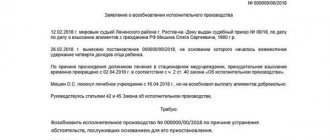Cases considered under simplified proceedings in civil proceedings
Simplified proceedings are a special procedure for considering cases, provided for in Chapter 21.1 of the Code of Civil Procedure of the Russian Federation, according to which courts of general jurisdiction consider cases of claim proceedings.
Unlike writ proceedings, consideration of cases through summary proceedings does not exclude the existence of a dispute about the law. The cases listed in part one of Article 232.2 of the Code of Civil Procedure of the Russian Federation, and with the consent of the parties, other cases are considered by magistrates and other courts of general jurisdiction in a simplified procedure.
Citizens—individuals and individual entrepreneurs, organizations, state authorities, local governments, and other bodies—have the right to file a statement of claim (application) for claims considered under simplified proceedings. The prosecutor has the right to file a statement of claim (statement) regarding the requirements considered in the specified order with a court of general jurisdiction within the limits of his powers.
Taking into account the provisions of paragraph 5 of part one of Article 23 of the Code of Civil Procedure of the Russian Federation, magistrates, in a simplified procedure, consider cases of claims for the recovery of funds or for the recovery of property, cases of claims for recognition of ownership rights, if the price of the claim does not exceed fifty thousand rubles, for with the exception of cases of inheritance of property and cases arising from relations involving the creation and use of results of intellectual activity (part one of Article 232.2 of the Code of Civil Procedure of the Russian Federation).
Other cases provided for in Article 232.2 of the Code of Civil Procedure of the Russian Federation are considered by district courts in a simplified procedure.
According to clause 1 of part one of Article 232.2 of the Code of Civil Procedure of the Russian Federation, courts of general jurisdiction consider cases of claims for the recovery of funds through summary proceedings, if the price of the claim considered by the court of general jurisdiction does not exceed one hundred thousand rubles.
In this case, the stated claims are subject to consideration through simplified proceedings only in cases:
- if the specified requirement is not subject to consideration in the order of writ proceedings;
- if a court order can be issued in accordance with the specified requirements, but the acceptance of an application for the issuance (issuance) of a court order according to these requirements was refused by the magistrate or the court order was canceled (part three of Article 125, Articles 128 and 129 of the Code of Civil Procedure of the Russian Federation).
In accordance with clause 1 of part one of Article 232.2 of the Code of Civil Procedure of the Russian Federation, funds that are subject to collection in a simplified procedure are understood as the amounts of the principal debt, as well as the amounts of interest and penalties (fines, penalties) accrued on the basis of a federal law or agreement, the total amount which should not exceed the limits established by these standards.
The price of a claim considered by a court of general jurisdiction and consisting of several independent claims is determined by the sum of all claims.
Claims arising from civil legal relations, one of which is of a property nature and relates to the requirements specified in part one of Article 232.2 of the Code of Civil Procedure of the Russian Federation, and the other is of a non-property nature, are considered in a simplified procedure if the court does not single out a claim that is non-property character into separate proceedings (part six of Article 232.2 of the Code of Civil Procedure of the Russian Federation). Thus, cases in which, along with the consumer’s demands for the recovery of funds subject to consideration in this order, are considered in a simplified procedure, a claim for compensation for moral damage is stated.
Within the meaning of paragraph 1 of part one of Article 232.2 of the Code of Civil Procedure of the Russian Federation, courts of general jurisdiction consider cases of reclaiming both movable and immovable property through summary proceedings. In this case, the value of real estate is determined based on its cadastral value, and the value of movable property and the value of real estate, information about the cadastral value of which is not available, is determined based on market value.
In accordance with paragraph 2 of part one of Article 232.2 of the Code of Civil Procedure of the Russian Federation, cases on claims for recognition of ownership rights are considered through simplified proceedings, if the value of the claim does not exceed one hundred thousand rubles. Such cases include, for example, cases on recognition of ownership of real estate.
By virtue of paragraph 3 of part one of Article 232.2 of the Code of Civil Procedure of the Russian Federation, courts of general jurisdiction, regardless of the amount of the stated claims, consider cases on claims based on documents submitted by the plaintiff establishing the monetary obligations of the defendant, which are recognized by the defendant, but not fulfilled, and (or) on documents , confirming the debt under the contract, except for cases considered in the order of writ proceedings.
Documents establishing the defendant's monetary obligations include, for example, a loan agreement, a credit agreement, an energy supply agreement, an agreement for the provision of communication services, a lease agreement, and a utility service agreement.
Documents confirming the debt under the contract include documents that contain written confirmation by the defendant that he has a debt to the plaintiff (for example, a receipt signed by the defendant, a response to the claim, a statement of settlement reconciliation signed by the parties).
The case is subject to consideration under simplified proceedings if the submitted documents confirm only part of the debt, and the part of the claims that is not confirmed by such documents does not exceed the limits established by paragraph 1 of part one of Article 232.2 of the Code of Civil Procedure of the Russian Federation.
If it is necessary to clarify additional circumstances or examine additional evidence, the court has the right to make a ruling to proceed to the consideration of the case according to the general rules of claim proceedings or proceedings in cases arising from administrative and other public legal relations (part four of Article 232.2 of the Code of Civil Procedure of the Russian Federation).
The requirements provided for in paragraph 3 of part one of Article 232.2 of the Code of Civil Procedure of the Russian Federation are subject to consideration through simplified proceedings in one of the following cases:
- if the cost of the claim exceeds the limits established by part one of Article 121 of the Code of Civil Procedure of the Russian Federation;
- if the cost of the claim does not exceed such limits, but the acceptance of the application for the issuance of a court order on these requirements was refused by the magistrate or the court order was canceled (part three of Article 125, Articles 128 and 129 of the Code of Civil Procedure of the Russian Federation);
- if the cost of the claim does not exceed the specified limits, but the claim is not subject to consideration in the order of writ proceedings (for example, a claim for the recovery of unaccrued wages to an employee).
The amount of money collected on the basis of paragraph 3 of part one of Article 232.2 of the Code of Civil Procedure of the Russian Federation can be recalculated as of the date of the court decision, as well as on the date of actual fulfillment of the monetary obligation.
By way of summary proceedings, courts of general jurisdiction may consider cases not included in the list contained in part one of Article 232.2 of the Code of Civil Procedure of the Russian Federation, if the parties have agreed to consider such a case according to the rules of simplified procedure and if there are no circumstances specified in parts three and four of Article 232.2 of the Code of Civil Procedure RF.
Coordination of the consideration of a case in a simplified procedure is carried out during the preparation of the case for trial by means of a party filing a petition for this and submitting the consent of the other party or submitting to the court the consent of the parties to consider the case in a simplified procedure, proposed at the initiative of the court (clause 5.1 of part one of the article 150, article 152, part two of article 232.2 of the Code of Civil Procedure of the Russian Federation).
The consent of the parties to consider the case through summary proceedings must be obvious, for example, follow from a written or recorded statement of the parties.
The absence of objections by the parties to the court's proposal to consider the case in summary proceedings does not in itself constitute consent to consider the case in such a manner.
Cases related to state secrets are not subject to summary proceedings; cases on disputes affecting children's rights; cases of compensation for harm caused to life or health; cases of special proceedings (part three of Article 232.2 of the Code of Civil Procedure of the Russian Federation), even if the parties agreed to consider such a case according to the rules of simplified proceedings.
Belgorod administrative center
Categories of cases
Simplified procedure, deadlines
Making a decision by the court, entering into legal force
Some procedural issues (state fees, legal costs)
The following categories of cases are considered under a simplified procedure:
on the collection of funds or on the recovery of property, if the price of the claim does not exceed 100,000 rubles, except for cases considered in the order of writ proceedings.
on recognition of property rights if the price of the claim does not exceed 100,000 rubles;
on claims based on documents submitted by the plaintiff establishing the defendant’s monetary obligations, which are recognized by the defendant but not fulfilled, and (or) on documents confirming the debt under the contract, except for cases considered in the order of writ proceedings.
The court, on its own initiative, or at the request of any of the parties with the consent of the other party, when preparing the case for consideration, may make a ruling on consideration of other cases through summary proceedings.
The following cases are not subject to consideration under simplified proceedings:
— arising from administrative legal relations;
- related to state secrets;
— on disputes affecting children’s rights;
- special production.
If a counterclaim is filed (which cannot be considered in a simplified manner), or a petition for a third party to intervene in the case is granted, or during the consideration of the case it turns out that the case cannot be considered in a simplified procedure, the court issues a ruling to consider the case according to general rules of claim proceedings.
The transition to the general order also occurs when:
- it is necessary to find out additional circumstances or examine additional evidence, as well as to inspect and study the evidence at its location, order an examination or hear testimony;
- the stated claim is related to other claims, including to other persons, or a judicial act adopted in this case may violate the rights and legitimate interests of other persons.
If several claims are filed, one of which is of a property nature, and the other claims are of a non-property nature (for example, for monetary compensation for moral damage) and the court does not separate these claims into separate proceedings, such claims are considered in a simplified procedure.
Simplified procedure, deadlines
When a case is received, the court issues a ruling on accepting the statement of claim for proceedings, which indicates consideration of the case in a simplified procedure, or a ruling on moving to consideration of the case in a simplified procedure, and sets a deadline for the parties to submit to the court hearing the case and send they provide each other with evidence and objections regarding the claims presented, which must be at least fifteen days from the date of the relevant determination.
The specified period for the submission of evidence and objections must be at least 30 days, and the period between the expiration date for the submission of evidence and objections and the expiration date for the submission of other documents must be at least 15 days
Important: if evidence and other documents were received by the court before the decision on the case was made, but after the deadlines established by the court had expired, the court accepts this evidence and other documents provided that the deadlines for their submission were missed for valid reasons.
Consideration of the case under simplified proceedings occurs without calling the parties.
When considering a case through summary proceedings, the rules on keeping a record and on postponing the trial of the case do not apply. A preliminary court hearing in cases considered under summary proceedings is also not held.
Making a decision by the court, entering into legal force
A decision in a case considered under summary proceedings is made by the court issuing the operative part of the decision, a copy of which is sent to the persons participating in the case no later than the next day after the day of its adoption and which is posted on the official website of the court on the Internet. .
An application for drawing up a reasoned court decision may be submitted by a party to the case within five days from the date of signing the operative part of the court decision. The reasoned court decision itself is made within five days from the date of receipt of the above application from a person participating in the case
A court decision in a case considered through summary proceedings shall enter into legal force after fifteen days from the date of its adoption, unless an appeal or presentation has been filed.
It can be appealed to the court of appeal within fifteen days from the date of its adoption, and in the case of drawing up a reasoned court decision at the request of the persons participating in the case, their representatives - from the day the decision is made in final form.
If a reasoned court decision is drawn up, such a decision comes into force after the expiration of the period established for filing an appeal.
If an appeal is filed, the decision, unless it is canceled or changed, enters into legal force from the date of adoption of the decision by the appellate court.
Some procedural points
When filing a statement of claim, which will be considered in a simplified manner, the state fee is paid in the same amount as for cases of claim proceedings, and the form and content of the statement of claim itself are subject to the same requirements as for statements of claim that are filed and considered in order of general proceedings.
In addition, when considering a case, legal costs (including payment for representative services) are reimbursed to the party(s) (or recovered from the party(ies)) according to the general rules.
Peculiarities of consideration of cases under simplified proceedings in civil proceedings
Cases under summary proceedings are considered according to the rules of claim proceedings with the features established by Chapter 21.1 of the Code of Civil Procedure of the Russian Federation, in particular, court hearings in these cases are not scheduled, and therefore the persons participating in the case are not notified of the time and place of the court hearing, recording in writing and using audio recording devices is not carried out; the rules on postponing the trial of a case (trial), on a break in a court hearing, on the announcement of a court decision do not apply (Article 232.1 of the Code of Civil Procedure of the Russian Federation).
When accepting a statement of claim (application) for proceedings, the court decides whether the case belongs to the categories of cases specified in part one of Article 232.2 of the Code of Civil Procedure of the Russian Federation.
If, according to formal characteristics, the case belongs to the categories of cases named in part one of Article 232.2 of the Code of Civil Procedure of the Russian Federation, then it must be considered in a simplified manner, as indicated in the determination to accept the statement of claim (statement) for proceedings (part two of Article 232.3 of the Code of Civil Procedure of the Russian Federation ). The consent of the parties to consider this case in this manner is not required.
The indication of third parties in the statement of claim is not in itself an obstacle to its consideration through simplified proceedings (part four of Article 232.2 of the Code of Civil Procedure of the Russian Federation).
If the case does not belong to the categories of cases subject to summary proceedings, the court, having accepted the statement of claim (statement) for proceedings according to the general rules of claim proceedings, begins preparing the case for trial (Articles 133 and 147 of the Code of Civil Procedure of the Russian Federation).
In the ruling on accepting a statement of claim (statement) for proceedings, on preparing the case for trial, the court may invite the parties to consider this case in a simplified procedure (part two of Article 232.2 of the Code of Civil Procedure of the Russian Federation).
When filing a statement of claim (statement) on a claim that is subject to consideration or considered in the order of writ proceedings, the plaintiff or applicant must indicate in the statement of claim (statement) the refusal to accept the application for the issuance (issuance) of a court order or the cancellation of a court order and attach copies of the relevant definitions.
If a copy of the relevant ruling is missing, but the applicant has applied for the issuance of a court order, such a statement of claim (statement) must be left without movement (Article 136 of the Code of Civil Procedure of the Russian Federation).
If the specified requirements were not considered in the order of writ proceedings, then the statement of claim (statement) is subject to return (clause 1.1 of part one of Article 135 of the Code of Civil Procedure of the Russian Federation).
Cases under summary proceedings are considered by a court of general jurisdiction within a period not exceeding two months from the date of receipt of the statement of claim (application) to the court (part one of Article 154 of the Code of Civil Procedure of the Russian Federation).
In the ruling on accepting a statement of claim (application) for proceedings, the court indicates consideration of the case in a simplified procedure and sets the following deadlines for the persons participating in the case to submit evidence and documents to the court and to each other (parts two and three of Article 232.3 of the Code of Civil Procedure of the Russian Federation):
1) fifteen days or more - both for the defendant to submit a response (objections) to the statement of claim (statement), and for the presentation by any person participating in the case of evidence to which he refers as the basis for his claims and objections;
2) thirty days or more - to submit only additional documents containing explanations on the merits of the stated requirements and objections in support of one’s position, but not containing references to evidence that was not disclosed within the period established by the court.
The deadlines for performing these actions can be determined by a court of general jurisdiction by indicating the exact calendar date or the period calculated from the date of the decision to accept the statement of claim (application) for proceedings or the decision to proceed to consideration of the case in a simplified procedure.
When determining the duration of this period, one should take into account the time for delivery of postal correspondence and the total period for consideration of the case under simplified proceedings. The period between the end of the first and second terms must be at least fifteen days.
When calculating the deadlines for the submission of evidence and documents by persons participating in the case to the court and to each other, it should be borne in mind that such deadlines in courts of general jurisdiction are calculated in calendar days (Articles 107 and 108, parts two and three of Article 232.2 of the Code of Civil Procedure of the Russian Federation).
Persons participating in a case considered in summary proceedings are considered to have received copies of the ruling on accepting the statement of claim (application) for proceedings and consideration of the case in summary proceedings, if by the day the decision is made the court has evidence of delivery of the relevant copies sent to them by registered mail with notification of delivery (part one of Article 113 of the Code of Civil Procedure of the Russian Federation), as well as in cases specified in parts two to four of Article 116 of the Code of Civil Procedure of the Russian Federation, or other evidence of receipt by persons participating in the case of information about the commencement of the trial.
Citizens bear the risk of consequences of failure to receive a copy of this determination due to circumstances beyond their control.
If by the day a decision is made in a case considered in summary proceedings, the relevant information has not been received by the court, or has been received, but clearly indicates that the person did not have the opportunity to familiarize himself with the case materials and present objections and evidence in support of his position in in the manner prescribed by part four of article 232.3 of the Code of Civil Procedure of the Russian Federation, the court issues a ruling to consider the case according to the general rules of claim proceedings, due to the need to clarify additional circumstances or examine additional evidence (part four of article 232.2 of the Code of Civil Procedure of the Russian Federation).
When applying part four of Article 232.3 of the Code of Civil Procedure of the Russian Federation, it is necessary to proceed from the fact that each person participating in the case, presenting evidence and documents, must take all measures within his power to ensure that before the expiration of the period established in the ruling, the court receives the documents he presents. response to the statement of claim, response to the application, evidence and other documents (including in electronic form) or information about the sending of such documents (for example, telegram, telephone message, etc.). Sending documents to the court and to the persons participating in the case by mail without taking into account the time of delivery of the correspondence cannot be recognized as a justification for the impossibility of timely submission of the document to the court, since the corresponding actions relate to circumstances depending on the person participating in the case.
Based on the peculiarities of consideration of cases in summary proceedings, the principles of adversarialism, equality and good faith of the parties, when presenting the specified evidence, documents and objections to a court of general jurisdiction, the persons participating in the case are obliged to forward them to each other, as well as submit to the court documents confirming forwarding such evidence, documents and objections to other persons participating in the case (part four of Article 1, Article 12, part one of Article 35, parts two and three of Article 232.2 of the Code of Civil Procedure of the Russian Federation).
If, along with evidence, documents and objections, documents confirming their forwarding to other persons participating in the case are not submitted to the court of general jurisdiction, then such evidence, documents and objections are not accepted by the court of general jurisdiction and are subject to return, about which a ruling is made.
When considering a case through summary proceedings, written evidence is presented taking into account the provisions of Articles 71, 72 of the Code of Civil Procedure of the Russian Federation.
The court, within the two-month period for consideration of the case, has the right, if necessary, to set additional deadlines for the presentation of original documents at the request of the court, requesting evidence in accordance with the rules of parts two - four of Article 57 of the Code of Civil Procedure of the Russian Federation.
If evidence and documents are received by the court after the expiration of the period established by the court, such evidence and documents are not accepted and not considered by the court and are returned to the persons by whom they were submitted, except in cases where the deadlines for the submission of such evidence and other documents are missed for valid reasons (part fourth article 232.3 of the Code of Civil Procedure of the Russian Federation).
A court of general jurisdiction has issued a ruling on the return of such documents (part four of Article 1 of the Code of Civil Procedure of the Russian Federation, part 4 of Article 228 of the Code of Arbitration Procedure of the Russian Federation).
If the impossibility of submitting evidence (documents) to the court, which, in the opinion of the court, is important for the correct resolution of the dispute, is recognized by the court as justified for reasons beyond the control of the person participating in the case (for example, the need to present evidence arose as a result of familiarization with the evidence presented by another person participating in the case at the end of the period for presenting evidence), such evidence (document) is taken into account by the court when it is received by the court no later than the date of the decision in the case and if there is an opportunity for persons participating in the case to familiarize themselves with such evidence (document ), and also express a position regarding it.
In this case, the court, within a two-month period for consideration of the case, sets a reasonable period for familiarizing the persons participating in the case with the presented evidence (documents).
If the court does not have the opportunity to set the period necessary to familiarize the persons participating in the case with the presented evidence (documents), the court has the right to make a ruling to consider the case according to the general rules of litigation, due to the need to clarify additional circumstances or examine additional evidence ( part four of article 232.3 of the Code of Civil Procedure of the Russian Federation).
Applications and petitions are considered by a court of general jurisdiction in the manner prescribed by Art. 166 of the Code of Civil Procedure of the Russian Federation without holding a court hearing and taking into account other features of the consideration of the case through summary proceedings.
A court of general jurisdiction considers the application and petition within a reasonable period of time, providing persons participating in the case with the opportunity to express their objections, and based on the results of their consideration, makes a ruling.
Based on the peculiarities of consideration of cases in summary proceedings, the principles of adversarialism, equality and good faith of the parties, when sending statements and petitions to a court of general jurisdiction, the persons participating in the case are obliged to send them to each other, as well as submit to the court documents confirming the sending of these statements and petitions to other persons participating in the case (part four of Article 1, Article 12, part one of Article 35, parts two and three of Article 232.3 of the Code of Civil Procedure of the Russian Federation).
When considering a case through summary proceedings, the parties have the right to enter into a settlement agreement.
A party or parties may send to the court, including in electronic form, a draft settlement agreement signed by them before the expiration of the period for consideration of the case under summary proceedings. In this case, the court does not proceed to consider the case according to the general rules of claim proceedings, but schedules a court hearing to consider the issue of approving a settlement agreement with summoning the persons involved in the case, as well as recording in writing and using audio recording devices (part two of the article 39, Article 173 of the Code of Civil Procedure of the Russian Federation).
If the settlement agreement is not approved at this court hearing, the court issues a ruling to consider the case according to the general rules of claim proceedings or according to the rules of proceedings in cases arising from administrative and other public legal relations, on the basis of paragraph 2 of part four of Article 232.2 of the Code of Civil Procedure of the Russian Federation.
What is the essence of simplified proceedings in civil cases?
Simplification of proceedings involves making a court decision solely on the basis of the received claim, documents and objections (responses to the claim). Without summoning the parties to the court hearing. But in compliance with the general rules of jurisdiction.
It is for this reason that the plaintiff must carefully analyze all the attachments to the claim. And provide additional evidence and objections in a timely manner.
The decision on whether there will be summary proceedings is made by the court. There are a number of cases when such proceedings are mandatory. And there are a number of cases when the court may invite the parties to consider the case in a simplified manner.
Since there is no court hearing, the parties are not notified of the time and place of the court hearing. There is no preliminary hearing. The rules on postponing the trial and keeping records do not apply.
The court's decision will be presented only in the operative part. A participant in the case can submit an application to draw up a reasoned decision (deadlines!).
But the case will be reviewed faster (compared to the usual process). But the period for appeal will be 15 days from the date of acceptance. And in the case of drawing up a reasoned decision - from the date of its production in full.
Transition to consideration of the case according to the general rules of claim proceedings
The transition to consideration of the case according to the general rules of claim proceedings is carried out by the court on its own initiative or at the request of a person participating in the case, if there are grounds provided for in part four of Article 232.2 of the Code of Civil Procedure of the Russian Federation.
The determination to consider the case according to the general rules of claim proceedings must contain the rationale for the court's conclusion that it is impossible to consider the case in a simplified procedure.
If, during the consideration of the case in the simplified procedure, the plaintiff files a petition to increase the amount of the claim, as a result of which the price of the claim exceeds the limits established by paragraph 1 of part one of Article 232.2 of the Code of Civil Procedure of the Russian Federation, the court proceeds to consider the case according to the general rules of claim proceedings.
If, as a result of an increase in the size of the claims, the price of the claim does not exceed the established limits, the question of the need to proceed to the consideration of the case according to the general rules of claim proceedings is decided by the court, taking into account the actual possibility of ensuring the right of the defendant to present objections and evidence in support of his position in the manner provided for in part two Article 232.3 of the Code of Civil Procedure.
Circumstances that impede the consideration of a case in a simplified procedure, specified in part four of Article 232.2 of the Code of Civil Procedure of the Russian Federation (for example, the need to clarify additional circumstances or study additional evidence), can be identified both when accepting a statement of claim (application) for proceedings, and during the consideration this matter.
If such circumstances are identified, the court issues a ruling to consider the case according to the general rules of claim proceedings, and indicates in it the actions that must be performed by the persons participating in the case and the deadlines for performing these actions (part five of Article 232.2 of the Code of Civil Procedure of the Russian Federation). Such a determination is not subject to appeal.
This determination may be made, inter alia, based on the results of the court's consideration of the petition of a person participating in the case, who indicated the presence of one of the circumstances provided for in paragraphs 1 and 2 of part four of Article 232.2 of the Code of Civil Procedure of the Russian Federation. This petition may be filed before the end of the consideration of the case on the merits.
If, during the consideration of a case in a simplified proceeding, a request for a third party to intervene in the case, either declaring independent claims regarding the subject of the dispute or not declaring them, is granted, the court issues a ruling to consider the case according to the general rules of claim proceedings (part four of Article 232.2 of the Code of Civil Procedure of the Russian Federation) .
Satisfying a party's request to involve a third party in the case or involving him on the initiative of the court (part one of Article 43 of the Code of Civil Procedure of the Russian Federation) is not in itself a basis for proceeding to consideration of the case according to the general rules of claim proceedings.
When considering a case under summary proceedings, third parties enjoy procedural rights and bear procedural responsibilities of the party (part one of Article 42, part one of Article 43 of the Code of Civil Procedure of the Russian Federation, part 2 of Article 50, part 2 of Article 51 of the Code of Arbitration Procedure of the Russian Federation). In this regard, the third party participating in the consideration of the case under simplified proceedings is sent a ruling to involve him in participation in the case.
Simultaneously with such a determination, in relation to Part 2 of Article 228 of the Arbitration Procedure Code of the Russian Federation, the specified person is sent the data necessary for his identification in order to access the case materials in electronic form.
Simplified proceedings with the consent of the parties
The second group of grounds for considering cases through summary proceedings includes cases where the application of such a procedure depends on the will of the persons participating in the case. In such cases, the initiator of the application of the simplified procedure for considering the case can be either one of the parties or the court. If the initiator of the application of the simplified procedure is the court, it is necessary to establish the consent of the parties to consider the case under the simplified procedure.
If the initiator is one of the parties, the court must establish a set of the following conditions:
- the party's request and
- consent of the other party to apply such a procedure for considering the case (Part 2 of Article 232.2 of the Code of Civil Procedure).
From Part 2 of Art. 232.2 of the Code of Civil Procedure of the Russian Federation it follows that a petition for consideration of a case through summary proceedings must be submitted at the stage of preparing a civil case for trial.
The defendant's petition can be filed only after the initiation of a civil case, at the stage of preparing the case for trial. Also, at the stage of preparing the case for trial, such a petition can be filed by the plaintiff. The parties can declare the application of the simplified procedure at the preliminary court hearing, in which case it is entered into the protocol, which is kept at the preliminary court hearing.
It should be noted that the legislator in this case does not use the property nature of the claims as a criterion, as in Part 1 of Art. 232.2 of the Code of Civil Procedure of the Russian Federation, indicating that other cases may be considered in this manner. Consequently, we can come to the conclusion that on these grounds, claims of both a property and non-property nature can be considered through simplified proceedings.
The possibility of applying a simplified procedure is determined by the court after receiving a request from a party and after receiving the consent of the other party (parties). Thus, even if the listed conditions are present, the possibility of considering a case through summary proceedings should be excluded in cases where the Code of Civil Procedure does not allow the possibility of considering a case through summary proceedings.
Judicial acts on cases considered under simplified proceedings in civil proceedings
A decision in a case considered under summary proceedings is made by a court of general jurisdiction no earlier than the expiration of the deadlines established for the presentation of evidence and other documents, but before the expiration of the two-month period for consideration of the case (part five of Article 232.3 of the Code of Civil Procedure of the Russian Federation).
The date the court rendered and signed the operative part of the decision is considered the date the decision was made (part one of Article 232.4 of the Code of Civil Procedure of the Russian Federation).
The decision made by issuing (signing) the operative part in a case considered in a simplified proceeding must contain, among other things, the basis for the occurrence of the obligation (for example, an agreement indicating the details), the composition of the debt being collected (amount of principal, interest and penalties) , the period for which the collection was made (Article 198 of the Code of Civil Procedure of the Russian Federation).
By virtue of part two of Article 232.4 of the Code of Civil Procedure of the Russian Federation, a court of general jurisdiction that has made a decision in a case considered in summary proceedings draws up a reasoned decision both upon the application of the persons participating in the case, their representatives, and in the case of filing an appeal or presentation.
A court of general jurisdiction has the right to make a reasoned decision on its own initiative. In this case, the decision comes into legal force and the period for appealing it is calculated from the date the decision is made by issuing (signing) the operative part.
If the deadline for filing an appeal or presentation is missed, then a reasoned decision on the case is made only if the specified deadline is restored.
A deadline missed for a good reason to file an application for drawing up a reasoned decision (for example, if a person participating in the case does not have information about a judicial act adopted in the summary procedure) may be restored by the court at the request of a person participating in the case in the manner , provided for in Article 112 of the Code of Civil Procedure of the Russian Federation. Taking into account the peculiarities of simplified proceedings, this petition is considered without a court hearing.
In the absence of a petition to restore the missed deadline, as well as in case of refusal to restore it, the court issues a ruling on the return of the application for drawing up a reasoned decision, which can be appealed (part five of Article 112, paragraph 2 of part one of Article 331 of the Code of Civil Procedure of the Russian Federation).
An application for drawing up a reasoned decision, filed before the court makes the operative part of the decision (for example, contained in the text of the statement of claim, response to the statement of claim), does not entail the obligation of the court to draw up a reasoned decision (part three of Article 232.4 of the Code of Civil Procedure of the Russian Federation).
A reasoned decision can be made only by the judge who signed the operative part of the decision (Article 157 of the Code of Civil Procedure of the Russian Federation).
Since in the case of filing an appeal or presentation in a case considered in a summary proceeding, the drawing up of a reasoned decision by a court of general jurisdiction is mandatory, the appellate instance of a court of general jurisdiction in the event of an appeal of the operative part of a decision in a case considered in a summary proceeding, and in the absence of the possibility the court of first instance makes a reasoned decision (for example, in the event of termination of the powers of a judge), cancels such a decision and sends the case to the court of first instance for consideration according to the general rules of claim proceedings (part three of Article 335.1 of the Code of Civil Procedure of the Russian Federation).
A decision made by issuing (signing) the operative part, a reasoned decision (if drawn up) in a case considered by a court of general jurisdiction in a simplified procedure, are posted on the Internet information and telecommunications network no later than the next day after their adoption or production ( part four of article 1 of the Civil Procedure Code of the Russian Federation, part 1 of article 229 of the Arbitration Procedure Code of the Russian Federation).
Rulings in cases considered through summary proceedings (for example, on termination of proceedings, on leaving an application without consideration, on the issue of legal costs) are made by signing the operative part by the judge. In this case, a reasoned determination is drawn up according to the rules of Article 232.4 of the Code of Civil Procedure of the Russian Federation (part four of Article 1 of the Code of Civil Procedure of the Russian Federation).
An application on the issue of legal costs incurred in connection with the consideration of a case in summary proceedings, filed during the proceedings of the case, is subject to consideration together with the main claim, regardless of the amount of the claimed legal costs, which is reflected in the decision made by issuing (signing) operative part.
If the issue of legal costs has not been resolved, but a demand for the collection of legal costs has been filed and evidence supporting it has been presented to the court, then the court has the right to make an additional decision in the manner prescribed by Article 201 of the Code of Civil Procedure of the Russian Federation without holding a court hearing and without notifying the persons participating in the case.
The decision of a court of general jurisdiction in a case considered in summary proceedings is executed after it enters into legal force (Article 209, Article 210, part one of Article 232.1 of the Code of Civil Procedure of the Russian Federation) or after its adoption in cases where the court applies for immediate execution of the decision (Article 211, 212 Code of Civil Procedure of the Russian Federation).
Opportunity to switch to simplified proceedings in civil cases
At the stage of preparing a case for trial, the court may make a ruling on consideration of other cases through summary proceedings, except for:
- cases of special proceedings (more details - statements on establishing a fact of legal significance)
- on children's rights
- from administrative offenses
- related to state secrets
To proceed to simplified proceedings, a petition from one of the parties and the consent of the other party must be received. Or the court itself initiates the transition to simplified proceedings, but with the consent of both parties.
In addition, already at the stage of resolving the issue of simplified proceedings (and even if they have already moved on to it), if:
- application for entry of a third party was granted
- a counterclaim has been accepted that cannot be considered in summary proceedings
- it is necessary to fulfill additional circumstances, examine evidence at its location, or additional evidence, order an examination, or require the involvement of witnesses. And a petition for this came from a party to the case. Or the court itself came to this opinion.
- the rights and interests of third parties may be violated (the claim is related to the rights of third parties) - at the request of a party to the case or a decision of the court itself.
The simplified proceedings initiated in such cases are cancelled. And the case is being considered in the general manner.







